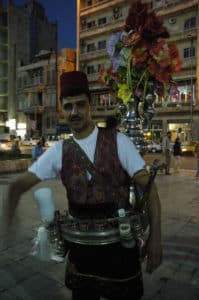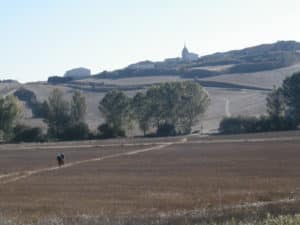Like Tangier for Twain, Aleppo is the spot we have been longing for all the time:
Elsewhere we have found foreign-looking things and foreign-looking people, but always with things and people intermixed that we were familiar with before, and so the novelty of the situation lost a great deal of force. We wanted something thoroughly and uncompromisingly foreign—foreign from top to bottom—foreign from center to circumference—foreign inside and outside and all around—nothing anywhere to dilute its foreignness—nothing to remind us of any other people or any other land under the sun.–The Innocents Abroad

I am a bit uncomfortable in my interactions, but it’s the uncomfortable I’ve desired. The vegetable vendors at the outdoor market are not used to selling their produce to foreigners, nor am I used to their Arabic, local prices, or bartering techniques.
I am uncomfortable most everywhere, in fact, and am probably naïve too. Maybe I’m being overcharged for my freshly-squeezed mango juice at the fruit stand, but I am too absorbed to give it a second thought.
My travel partner and I are so enthralled with this complete foreignness, the foreignness that Twain describes, and we haven’t even entered the old city and souks for which Aleppo is famous. Here, the new city is a novelty to us.
The first morning in Aleppo I awoke to the call to prayer. It echoed throughout the narrow streets and radiated up from the roof tops just as it had in all the other cities we had traveled through for the past two months. But this morning, it was a real person singing. In Turkey we were used to recorded prayers that sounded harsher than a worn-out 8-track tape from the 70’s. In Northern Cyprus I buried my head under the pillow at 4am. Even though my sleep was interrupted in Aleppo, I had still appreciated its beauty.
A few hours later, at about 9am, I heard church bells. At first I didn’t think it was possible. I hadn’t heard clanking bells since Bulgaria. But later I read that ten percent of the Syrian population is Christian and the secular government is tolerant of these different faiths.
Coming from modern and westernized Turkey, Syria seems so vastly different. It is both visually shocking and stimulating to the senses. To begin, everything is in Arabic. The first thing we had to do was learn how to read the numbers. (Arabs don’t use what we call “Arabic numerals”) Adding to this, Aleppean society is very conservative. Almost no women are seen on the streets without a headscarf and many are wearing the chador.
You won’t find international chains in Aleppo and there aren’t even supermarkets here. People still do their shopping in the souqs. The souqs are covered and still preserved from medieval times. In Aleppo you will come closer to experiencing a medieval city center better than anywhere else in the Middle East.
I am often in search of places that are “thoroughly and uncompromisingly foreign” but with our shrinking and globalized world, these places are increasingly uncommon.
But in Syria, on the streets of Aleppo, I found Twain’s Tangier.
Stephen Bugno, August 2007




Pingback: Couch Surfing Over 50 | GoMad Nomad Travel Mag
Pingback: 7 Super Shots | Bohemian Traveler